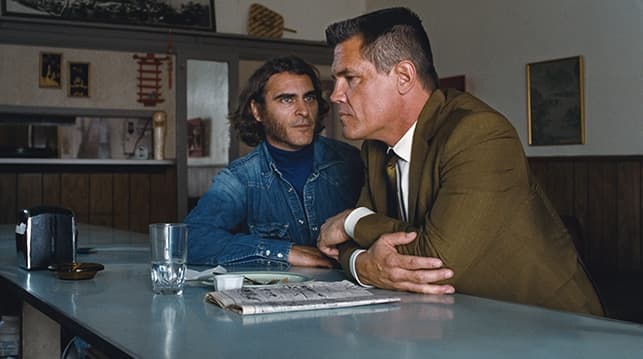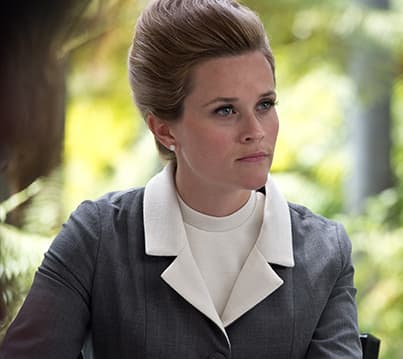Advertisement
Anderson's Pynchon Adaptation 'Inherent Vice:' A Stylish, Slow Burn

A famously unadaptable postmodern novelist and one of Hollywood’s preeminent neo-auteurs. The circuit loop between Thomas Pynchon and Paul Thomas Anderson seemed charged with possibility, and when the trailer for “Inherent Vice” appeared online in September, it caused a sensation among certain nerdy corners of the Internet.
Rumors began circulating that Pynchon himself had a cameo. Anderson described the movie as part noir, part Cheech and Chong. The trailer earned “Lebowski” comparisons. With expectations this high, the film was perhaps bound to be a curveball. Sure enough, “Inherent Vice” is something other and apart from the sum of its hype cycle.
But what is that exactly? Despite such anticipation, it isn’t a powerhouse feature. It is many other things: a detective story, a romance, a bromance, a romp through early 70s California, an exploration of the intermingling and exchange between the “straight” world and the fading counterculture.
“Inherent Vice” gets a wide release Jan. 9, though lucky Bostonians, including yours truly and a boatload of eager Emerson undergrads, were able to catch an advance screening through Emerson’s Bright Lights series earlier in December.
(Interesting factoid: PTA did two semesters at Emerson in the early 1990s, where he had David Foster Wallace, a fellow Pynchon disciple, as an instructor. Years later, Wallace toyed with the idea of writing a novel about the pornography industry, but his old student’s first major film, “Boogie Nights,” beat him to it. Wallace would instead write his famous “Infinite Jest.”)

Boston moviegoers will get a story that is as shaggy as they come, with no easy answers, no tidy tie-ups. The basic premise is that Joaquin Phoenix’s Doc Sportello, a pot-smoking private eye, is enlisted by his ex-girlfriend Shasta Fay-Hepworth (Katherine Waterston) to look into the disappearance of her boyfriend, a married LA real estate developer, Mickey Wolfmann (Eric Roberts).
The mysteries quickly multiply from there when Shasta herself disappears, Doc is caught up in the murder of one of Wolfmann’s bodyguards, he is put upon to rescue a surf saxophonist in hiding (Owen Wilson), manage the inner dealings of the LAPD and his rival, “Bigfoot” Bjornsen (Josh Brolin), all while investigating a mysterious entity known as the Golden Fang—which may or may not be a drug cartel, a syndicate of exploitative dentists, or a cult.
If this sounds loopy, that’s because it’s trademark Pynchon. In Pynchon’s America, everything feels on the brink of conspiracy, of interconnectivity, but often disappears into incoherence before it can reveal itself. Paranoia is the watchword, and here it’s bolstered by liberal drug use. Things devolve and untangle around the ¾ mark, as the film succumbs to a kind of narrative inertia.
Still, the film’s performances and antics do make up for its narrative ambiguity.

At the thematic center of the movie, somehow more evident than Doc and Shasta’s relationship, is the sideways-buddy-cop-romance between Doc’s hippie detective and Brolin’s crew-cut Bigfoot.
There’s a lot of humor and a subtle kind of respect between the two, and Anderson plays the men off one another with the same skill he did Phoenix and Philip Seymour Hoffman in “The Master.”
Phoenix is fantastic. If nothing else “Inherent Vice” solidifies his preeminence as a performer today, and proves that Anderson knows how to use this actor’s intensity in different contexts. As Doc, Phoenix is dazed, intense, goofy with sudden left turns of vocal and facial outburst. He draws on a fantastic personal tension between Doc’s bumbling intoxication and professional aptitude.

Brolin, Wilson and Waterson are all great, but for such a stellar and deep lineup, some actors are sadly underused here. Michael K. Williams, Hong Chau, Martin Short, Reese Witherspoon, Benicio Del Toro and Maya Rudolph all appear and disappear without a chance to solidify their characters in a strong way. We can only hope that, like “The Master,” a reel of cut scenes will surface that includes some more screen time for them.
Even while it swims among postmodern torpor, “Inherent Vice” ends up attending to rather classic themes and narratives: conflict and reconciliation between people of different social strata, the reunion of a marriage and a family, lost love, the righting of wrongs.
And yet, this film is still more stylish than it is soulful. It doesn’t feel quite up to Anderson's unusually high standard, set by his more recent, deadly serious work. It provides a better time at the movies than these features, however—funnier, more madcap, campier in its own weird, Pynchonian way.
Charles Thaxton is a freelance writer living in Somerville. You can follow him on Twitter here and Tumblr here.
